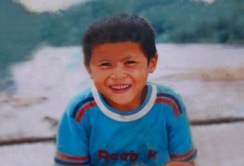е“ҖеӮ·зҡ„家長
йҖҷ9жӯІеӨ§з”·еӯ©зҡ„зҲ¶жҜҚи«Үиө·жӮІеҠҮзҷјз”ҹзҡ„йӮЈдёҖеӨ©, йӮЈжҷӮз”·еӯ©е°ҫйҡЁи‘—2еҗҚжӯЈеңЁи’җйӣҶзӮёеҪҲжә–еӮҷ當廢йҗөиіЈзҡ„еҗҢзҸӯеҗҢеӯё.
дәӢжғ…зҷјз”ҹжҷӮ, зҲ¶жҜҚжӢје‘Ҫи·‘еҲ°йқһеёёеҺҹе§Ӣзҡ„йҶ«йҷў, еёҢжңӣеҸҜд»ҘжүҫеҲ°йҶ«зҷӮж”ҜжҸҙ幫еҠ©д»–еҖ‘еҸ—йҮҚеӮ·зҡ„е…’еӯҗ.
д»ҘдёӢзӮәиЁӘи«Үз”·еӯ©зҲ¶жҜҚзҡ„еҪұзүҮ, й–Ӣй ӯжңғзөҰдҪ еҖ‘зңӢеҲ°дёҖеҖӢе°ҸBombieзҡ„еЁҒеҠӣ, йҖҷжҳҜз”ұJimеңЁиІ 責幫еұ…ж°‘йҠ·жҜҖжңӘзҲҶеҪҲжүҖжӢҚж”қдёӢдҫҶзҡ„.
- Jim: When did it happen? В (В д»ҖйәјжҷӮеҖҷзҷјз”ҹзҡ„?)
- Mother: Three years ago. В ( еӨ§жҰӮжҳҜдёүе№ҙеүҚ.)
- Jim: Was a raining season or dry season? В ( йӮЈжҷӮжҳҜйӣЁеӯЈйӮ„жҳҜд№ҫеӯЈ? )
- Mother: Dry season, April В ( д№ҫеӯЈ, еӣӣжңҲжҷӮ.)
- Jim: How old was your son when it happened? В ( дәӢжғ…зҷјз”ҹжҷӮдҪ е…’еӯҗе№ҫжӯІ? )
- Mother: 9 Year Old В ( 9жӯІ )
- Jim: And who were the other boys? Were they relatives or friends?
- ( еҸҰеӨ–е…©еҖӢз”·еӯ©жҳҜиӘ°?иҰӘжҲҡйӮ„жҳҜжңӢеҸӢ?)
- Mother: They study in the same class. В (д»–еҖ‘еңЁеҗҢеҖӢзҸӯзҙҡдёҠиӘІ )
- Jim: Where did they get the idea to go find scrap? How did they open that?
- (жҳҜиӘ°еҸ«д»–еҖ‘еҺ»жүҫе»ўйҗө?д»–еҖ‘жҳҜжҖҺйәјжү“й–Ӣзҡ„(зӮёеҪҲ)?)
- Mother: They are follow big people ( adult ) to looking for scrap to sell. Just maybe the first time. (д»–еҖ‘еңЁи·ҹйҡЁеӨ§дәәеҺ»жүҫе»ўйҗөиіЈ. йҖҷжҳҜд»–еҖ‘第дёҖж¬ЎеҺ».)
- Jim: Did they have metal detector? ( д»–еҖ‘жңүйҮ‘еұ¬жҺўжё¬еҷЁе—Һ?)
- Mother: The boy not have only big people ( adult ). (еҸӘжңүеӨ§дәәжңү, з”·еӯ©жІ’жңү.)
- Jim: So they followed along? (жүҖд»Ҙд»–еҖ‘еҸӘжҳҜи·ҹи‘—еҺ»?)
- One lady: Did the people ask them to come? Or they? (жңүдәәеҸ«д»–еҖ‘еҺ»е—Һ?йӮ„жҳҜ?)
- Mother: No, not us. Just follow. (жІ’жңү, жҲ‘еҖ‘жІ’жңү. д»–еҖ‘еҸӘжҳҜи·ҹи‘—.)
- Father: This is how it was… my youngest son died from the bomb. В The adults had metal detectors. They used the detectors to search for scrap. В When they found metal they sold it for money. В If the adult found bombs they set them aside. В The boys didn’t know thos pieces were bombs. В They went to get them to collect for money.В (жғ…еҪўжҳҜйҖҷжЁЈеӯҗзҡ„….жҲ‘жңҖе°Ҹзҡ„е…’еӯҗжӯ»ж–јзӮёеҪҲзҲҶзӮё. В еӨ§дәәжңүйҮ‘еұ¬жҺўжё¬еҷЁ. д»–еҖ‘з”ЁжҺўжё¬еҷЁеҺ»ж”¶йӣҶе»ўйҗө. 當他еҖ‘жүҫеҲ°е»ўйҗө, д»–еҖ‘е°ұиіЈжҺүиіәйҢў. еҰӮжһңеӨ§дәәжүҫеҲ°зӮёеҪҲ, д»–еҖ‘жңғжҠҠе®ғ移еҲ°ж—ҒйӮҠ. з”·еӯ©еҖ‘дёҚзҹҘйҒ“йӮЈдәӣжҳҜзӮёеҪҲ. д»–еҖ‘жғіеҺ»и’җйӣҶиө·дҫҶжӢҝеҺ»жҸӣйҢў.)
- Jim: So the boys found the bombie that the big people left behind?В В (жүҖд»Ҙз”·еӯ©жүҫеҲ°еӨ§дәәз•ҷдёӢдҫҶзҡ„зӮёеҪҲ?)
- Father: Yes. The adult set them aside. (жҳҜзҡ„. еӨ§дәәжҠҠе®ғж”ҫеҲ°дёҖйӮҠеҺ».)
- Jim: And they picked up, they they tried to open it or how did the accident happened? В В В В (然еҫҢз”·еӯ©ж’ҝиө·дҫҶ, д»–еҖ‘и©Ұи‘—жү“й–ӢйӮ„жҳҜ…?ж„ҸеӨ–зҡ„жҖҺйәјзҷјз”ҹзҡ„?)
- Father: The boys struck the bombs together! В When the bomb exploded, my son didn’t die immediately. В But his guts were coming out from and open wound in his side. В The other two boys were the ones who struck the bombs together. В My son was standing back and just watching. (з”·еӯ©еҖ‘дёҖиө·ж•Ій–ӢйӮЈзӮёеҪҲ! 當зӮёеҪҲзҲҶзӮёжҷӮ, жҲ‘е…’еӯҗдёҰжІ’жңүз«ӢеҚіжӯ»дәЎ. дҪҶд»–зҡ„и…ёеӯҗдёҖзӣҙдёҚж–·еҫһеӮ·еҸЈи·‘еҮәдҫҶ. В дёҖиө·ж•ІзӮёеҪҲзҡ„жҳҜеҸҰеӨ–е…©еҖӢз”·еӯ©. жҲ‘зҡ„е…’еӯҗеҸӘжҳҜз«ҷеңЁеҫҢйқўзңӢи‘—.)
- Yel: How did you learn about the accident? В (дҪ жҳҜжҖҺйәјзҹҘйҒ“ж„ҸеӨ–зҷјз”ҹзҡ„?)
- Mother: Villagers who were herding buffalos heard the explosion and came to get us. (жӯЈеңЁж”ҫзү§ж°ҙзүӣзҡ„жқ‘ж°‘дёҖиҒҪеҲ°зҲҶзӮёиҒІз«ӢеҲ»дҫҶеҸ«жҲ‘еҖ‘.)
- Father: They told us, “Your son and the other boys are hurt! В When we got to my osn he said, “Father, take me to the hospital.” В He said, “Hurry, so I don’t die!” В ” В (д»–еҖ‘и·ҹжҲ‘иӘӘ,гҖҢдҪ е…’еӯҗе’Ңе…¶д»–з”·еӯ©еҸ—еӮ·дәҶ!гҖҚжҲ‘еҖ‘趕еҲ°е…’еӯҗиә«йӮҠжҷӮ, д»–иӘӘ, гҖҢзҲёзҲё, её¶жҲ‘еҺ»йҶ«йҷў.гҖҚгҖҢ趕еҝ«, жүҖд»ҘжҲ‘е°ұдёҚжңғжӯ»дәҶ!гҖҚ)
- Father: My son didn’t strike the bombs. My son wasn’t killed instantly. В The blast lifted one of the boys and threw him into the air! (жҲ‘е…’еӯҗдёҰжІ’жңүеҺ»ж•ІйӮЈзӮёеҪҲ. жҲ‘е…’еӯҗд№ҹжІ’жңүйҰ¬дёҠжӯ»дәЎ. зӮёеҪҲжҠҠе…¶дёӯдёҖеҖӢз”·еӯ©жӢӢеҲ°з©әдёӯеҺ».)
- Jim: So they both go the Nakal to the hospital? В (How did you get your son to the hospital?) (жүҖд»ҘдҪ еҖ‘е…©еҖӢйғҪеҺ»Nakalзҡ„йҶ«йҷўе—Һ?) (дҪ еҖ‘жҖҺйәјжҠҠе…’еӯҗеё¶еҲ°йҶ«йҷўеҺ»зҡ„?)
- Mother: We hired a truck to take our son to the hospital In Nakal. В When we got there…. no oxygen. В No Blood! (жҲ‘еҖ‘йӣҮз”ЁдёҖеҖӢеҚЎи»Ҡеё¶жҲ‘еҖ‘зҡ„е…’еӯҗеҺ»Nakalзҡ„йҶ«йҷў. В жҲ‘еҖ‘еҲ°дәҶд№ӢеҫҢ…жІ’жңүж°§ж°Јзӯ’, д№ҹжІ’жңүиЎҖиўӢ.)
- Jim: So Nakal, no oxygen, no blood. (жүҖд»ҘNakalжІ’жңүж°§ж°Ј, жІ’жңүиЎҖиўӢ.)
- Mother: No. Nothing. В Nothing at all. (жІ’жңү. йӮЈиЈҸд»ҖйәјйғҪжІ’жңү.)
- Jim: So then they tried to go to? ( жҺҘдёӢдҫҶдҪ еҖ‘еҺ»дәҶе“ӘиЈЎ? )
- Mother: If the hospital had oxygen and blood, my osn would not have died. (еҰӮжһңйҶ«йҷўиЈЎж°§ж°Ји·ҹиЎҖиўӢзҡ„и©ұ, жҲ‘зҡ„е…’еӯҗе°ұдёҚжңғжӯ»дәҶ.)
- Jim: So did they go next? Yommalat? (жүҖд»ҘдҪ еҖ‘жҺҘдёӢдҫҶеҺ»дәҶе“ӘиЈЎ?Yommalat?)
- Father: We went to Yommalat but it was the same story. В No blood. В No oxygen. В We couldn’t make it to The Khaek. В We came back home and he died. В No blood. В Nothing at the hospital. В We came back home and he died. (жҲ‘еҖ‘еҺ»дәҶYommalat, дҪҶжҳҜд№ҹжҳҜдёҖжЁЈ. жІ’жңүиЎҖ. жІ’жңүж°§ж°Ј. В жҲ‘еҖ‘жІ’иҫҰжі•еҶҚ趕еҲ°Khaek. В жҲ‘еҖ‘дёҖеҲ°е®¶, д»–е°ұжӯ»дәҶ. В жІ’жңүиЎҖиўӢ. йҶ«йҷўиЈЎд»ҖйәјйғҪжІ’жңү. жҲ‘еҖ‘еӣһ家, 然еҫҢд»–е°ұжӯ»дәҶ.)
- Mother: The driver didn’t want him to die in his truck. At home our son was very thirsty and asked for water. В I said, “No”. В Then, he died. (еҸёж©ҹдёҚжғід»–жӯ»еңЁд»–зҡ„и»ҠдёҠ. еӣһ家еҫҢ, жҲ‘е…’еӯҗйқһеёёзҡ„жёҙ, жүҖд»Ҙд»–жғіиҰҒе–қж°ҙ. В жҲ‘иӘӘ, гҖҢдёҚиЎҢ.гҖҚ然еҫҢд»–е°ұжӯ»дәҶ.)
- Yel: All in all, you both did very well. В You couldn’t give him water. В It was the right decision to have him die at home. (дёҚз®ЎжҖҺйәјиӘӘ, дҪ еҖ‘е…©еҖӢйғҪеҒҡеҫ—еҫҲеҘҪ. дҪ еҖ‘жІ’иҫҰжі•зөҰд»–ж°ҙ. и®“д»–еңЁе®¶дёӯйӣўеҺ»жҳҜе°Қзҡ„жұәе®ҡ.)
- Father: We couldn’t make it to Tha Khaek. В No oxygen. No blood. Better to die at home. (жҲ‘еҖ‘жІ’жі•еҲ°Khaek. жІ’жңүж°§ж°Ј. жІ’жңүиЎҖ. еңЁе®¶жӯ»еҺ»жҳҜжңҖеҘҪзҡ„дәҶ.)

